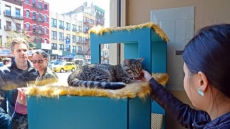OTTAWA — The governor of the Bank of Canada may be a serious Star Trek buff, but he's not about to encourage others to doodle Spock ears on Sir Wilfrid Laurier's image on the $5 bill.
Stephen Poloz said Wednesday that he didn't think anyone should deface the currency, even though there's no law that explicitly prohibits scribbling on Canadian banknotes.
"Well, even though I'm a big Star Trek fan, as you know, I wouldn't encourage anyone to deface the currency," Poloz told a news conference in Ottawa.
Resistance to the uniquely Canadian practice known as "Spocking," however, may be futile.
The death of actor Leonard Nimoy in late February inspired people to post photos on social media of $5 bills that depict the seventh prime minister as Spock, Nimoy's legendary "Star Trek" character.
Canadians have been sketching Spock's pointy Vulcan ears, long eyebrows and distinct bowl haircut on Laurier's likeness on the bill since long before Nimoy's death. But it was in the days following his death — spurred on by social media — that the pastime caught the eyes of Star Trek fans around the world.
The central bank has said it discourages drawing on banknotes because it reduces the lifespan of the bills and could damage their security features.
Poloz, who has been known to reference Star Trek in his speeches, only made a brief remark when asked about Spocking.
He delegated the question to senior deputy governor Carolyn Wilkins, who's responsible for currency at the central bank.
In doing so, a smiling Poloz quipped: "She's not as much of a Star Trek fan, so she's more objective."
Wilkins, sitting next to Poloz, said it's "inappropriate" to write on the notes.
She called it wasteful, because it could lead to their refusal as a medium of exchange and because the bills are a source of national pride.
She would not, however, go as far as to say that new rules were needed to protect the notes from scribblers.
She was asked whether she would welcome a measure to keep people from defacing the bills, perhaps in the form of the law that prohibits people from melting down or breaking Canadian coins.
"I think the current system works fine the way it is," Wilkins said.






